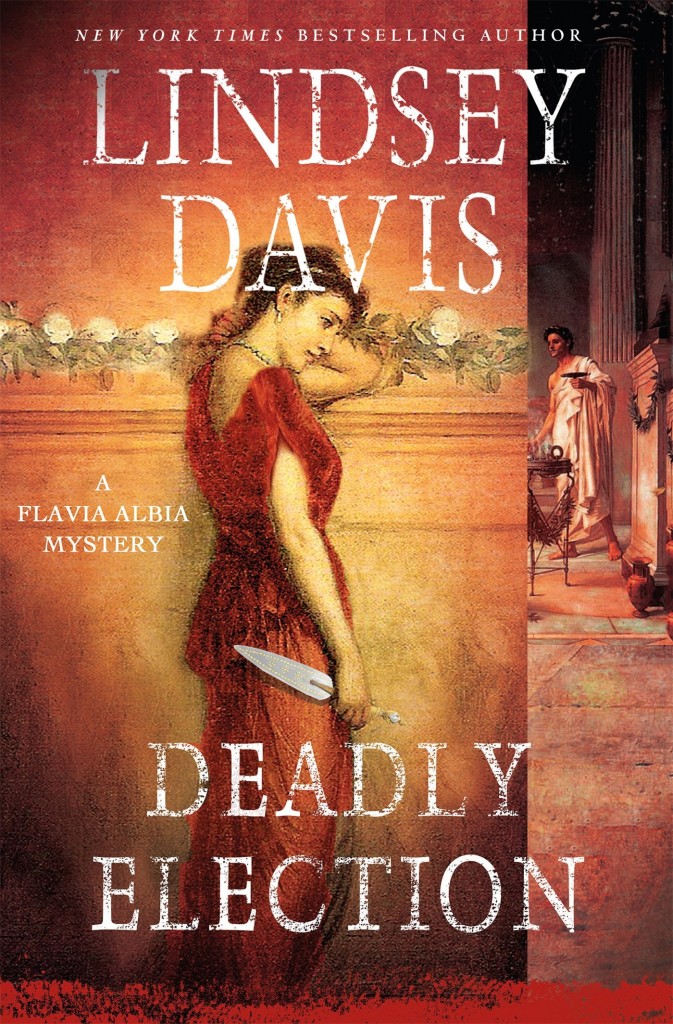Without a doubt, Lindsey Davis is one of the most skilled writers of fiction in recent memory. Her novels are characterized by wit, good historical research (she writes ancient Rome novels set mostly in the first century A.D.),quirky but likable protagonists, and killer plot twists. Mostly, it is her sense of whimsy and rhetorical banter that sets her novels apart from some of her competitors in the field of ancient Roman novels (cf. Saylor, McCullough, Harris). What I especially enjoy about these novels is that you absorb a lot of data about the world of Rome painlessly while enjoying a good story. For example, ‘Deadly Election’ is about how Roman citizens obtained offices during the Empire when democracy was hardly in fashion. So for example you learn about candidates, a word which comes from the Latin candida meaning white. Why that word, you ask? Because the ‘candidates’ wore white togas, further whitened by chalk so they would stand out in a crowd. There are various funny scenes in this novel where a candidate has ‘over-chalked’ his toga, leading to much coughing and sneezing. Then there is the word ‘petitor’ which refers to someone striving for office against another candidate, who naturally enough is called his ‘com-petitor’. Who knew this is where these English words came from? I can certainly say that one of the reasons I have the grasp of the English language that I do, is because after three years of Latin in junior and senior high school, it was obvious just how indebted English is to Latin. But I digress.
Lindsey Davis is now in her third Flavia Alba, female detective (or as she would be called then -‘informer’) novel. The second novel, The Ides of April, already reviewed on this blog, was really very good indeed. The third one doesn’t fail to entertain and inform either. Once again we have a mysterious death or two— an unknown man found dead in a strong box that Flavia Alba’s family business (auctioning off antiques), somehow acquired. Alba must get to the bottom of this trunk, err mystery, without gagging on the smell of the corpse. Meanwhile her blossoming relationship with her aedile friend who nursed her back to health in the last novel, Tiberius Manlius Faustus, takes an interesting turn– will he do the manlius thing? Inquiring minds want to know. Alba is a proto-feminist of sorts, so she doesn’t make the romancing all that easy for Faustus.
There is a fine line between slowly building tension in a novel, and over-doing it so that the plot seems to plod along rather than entertain properly and continue to spark the reader’s curiosity. This novel is frankly a bit on the slow side, with the ‘reveals’ coming late in the novel. The reader continues to be engaged because of liking Flavia Alba, and her budding romance, and enjoying the wit and Roman history along the way. But the real issue with this novel is it involves a huge tangled mess of a family tree, with far too many Julia’s in the family under suspicion of murder. The family tree is not cut down to size until very late in the novel(see the chart on p. 277), at which point the reader may be so thoroughly confused as to who is who, that they have thrown up their hands in total frustration. Was it Julia Terentia with the knife in the kitchen, was it Julia Pomponia with the club in the closet, was it Julia Optata with the axe in the peristyle garden? Oh wait, that’s the game of Clue, but you get the point. Not enough clues, too many Julias in one family tree. Still, this 309 page novel is enjoyable as long as one can get over the frustration of not being able to tell the cast of characters without a big chart. And the fourth novel in the series, which is supposed to be centered around a big wedding for Flavia Alba and her manliest Manlius should be fun, is already scheduled for next summer. You might want to read this one now, and leave the next one for your summer beach reading in 2016.












